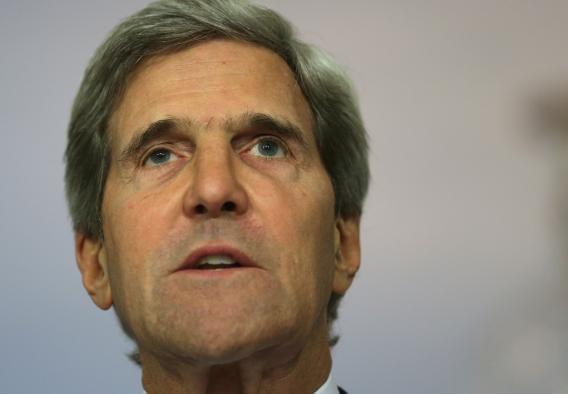At Tuesday’s Senate Foreign Relations Committee hearing, John Kerry once again made the case for a military strike in Syria to a still-dubious public. He was all-too sensitive to that public sentiment: “President Obama is not asking America to go to war,” Kerry said. “If Assad is arrogant enough, and I would say foolish enough, to retaliate to the consequences of his own criminal activity, the United States and our allies have ample ways to make him regret that decision without going to war.”
More than any of Kerry’s comments so far, reporters jumped on his exchange with committee chair Bob Menendez seeming to imply Kerry was not counting out the option of sending in ground troops (full transcript here):
SEN. MENENDEZ: Mr. Secretary, we received from the administration a proposed resolution for the authorization of force, and of course that is a negotiation between the Congress and the administration. Would you tell us whether you believe that a prohibition for having American boots on the ground – is that something that the administration would accept as part of a resolution?
SEC. KERRY: Mr. Chairman, it would be preferable not to, not because there is any intention or any plan or any desire whatsoever to have boots on the ground. And I think the president will give you every assurance in the world, as am I, as has the secretary of defense and the chairman. But in the event Syria imploded, for instance, or in the event there was a threat of a chemical weapons cache falling into the hands of al-Nusra or someone else and it was clearly in the interest of our allies and all of us, the British, the French and others, to prevent those weapons of mass destruction falling into the hands of the worst elements, I don’t want to take off the table an option that might or might not be available to a president of the United States to secure our country.
But when his “take off the table” statement came up later, Kerry was quick to clarify his suggestion: “Let’s shut that door now as tight as we can. All I did was raise a hypothetical question,” Kerry said. “There will not be American boots on the ground with respect to the civil war.”
Chuck Hagel made up for Kerry’s ambiguous comment by saying the solution in Syria is not a military one—in his prepared testimony, Hagel said the violence in Syria can ultimately only be solved by Syrians forging their own political peace. Still, he insisted on a strike’s import to protecting U.S. allies:
The Syrian regime’s use of chemical weapons poses grave risks to our friends and partners along Syria’s borders including Israel, Jordan, Turkey, Lebanon and Iraq. If Assad is prepared to use chemical weapons against his own people, we have to be concerned that terrorist groups like Hezbollah, which has forces in Syria supporting the Assad regime, could acquire them. This risk of chemical weapons proliferation poses a direct threat to our friends and partners, and to U.S. personnel in the region. We cannot afford for Hezbollah or any terrorist group determined to strike the United States to have incentives to acquire or use chemical weapons.
To a less dangerous extent, the same could be said of U.S. arms and jihadists, as Max Fisher points out in his very handy FAQ:
The military options are all bad. Shipping arms to rebels, even if it helps them topple Assad, would ultimately empower jihadists and worsen rebel in-fighting, probably leading to lots of chaos and possibly a second civil war (the United States made this mistake during Afghanistan’s early 1990s civil war, which helped the Taliban take power in 1996)
Kerry surely understands all this, which is why he was so quick to correct himself with the “boots on the ground” question. And meanwhile, Bashar al-Assad’s official Instagram account posted a recent Assad quote on how he’s defending the interests of the Syrian people.
